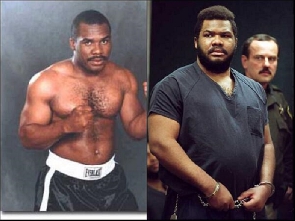Heavyweight boxer Ike “The President” Ibeabuchi was destined to the top like Mike Tyson and like just Tyson saw his world crash down due to series of mental and legal issues outside the ring that eventually led to his incarceration for sexual assault. OLUWAMAYOMIKUN OREKOYA looks into the troubling life of the Nigeria-born former heavyweight champion.
Disgraced former heavyweight boxer Ike Ibeabuchi and boxing legend Mike Tyson in many ways shared a unique link that would bound both boxers to the tragic dizzy heights and fall from grace that is mostly associated with great boxers.
After 20 years in and out of the prison system, Ike, who was one of the hottest prospects in heavyweight boxing before several run-ins with the law in the United States of America, once again regained freedom in November 2020.
Strangely the two heavyweights’ lives were almost weirdly similar; Like Mike Tyson, Ike grew up more or less destitute; Like Mike Tyson, he rose to dizzying heights as an heavyweight banger and knockout specialist with finesse.
Also like Mike Tyson, The President’s blossoming career finally came to an end when he was also jailed for sexual assault. Recall in 1992, Tyson was convicted of convicted of the rape of Desiree Washington and sentenced to six years in prison, although he was released on parole after three years and like Mike Tyson, Ike drove his car into stationary objects and spent most of his respective prime behind bars in American jail whilst blaming his numerous woes on mental illness.
One can say Tyson inspired “The President”, a moniker Ike liked to be addressed as, to become a boxer. After all, the Isuochi, Abia-State born Ike abandoned his plans to join the Nigerian army after stumbling on a video of a then undefeated Tyson’s shocking knockout defeat to Buster Douglas in 1990, an upset that sent shockwaves around the boxing and sporting world.
“I was mesmerised by the fight. People were talking about Buster winning and I wanted to be in his place. I felt shivers all over my body and I knew then I didn’t want to be in the military anymore,” Ike stated in a past interview.
Inspired by the fight, Ike started boxing as an amateur and twice defeated countryman and eventual 1996 Olympic Bronze medalist Duncan Dokiwari. He would later emigrate to the United States and moved to the Dallas area with his mother in 1993 and won the Dallas and Texas State Golden Gloves tournaments at heavyweight a year later.
“The President” made his professional debut at heavyweight with a second-round knockout of Ismael Garcia on October 13, 1994 under the guidance of former world welterweight champion Curtis Cokes and won 16 straights fights- 12 via knockouts- before making the big jump and fought undefeated prospect David Tua for the WBC International Heavyweight title on June 7, 1997. Tua was 27-0 and considered by many analysts to be ‘the next Mike Tyson’.
Both boxers threw bombs and neither took a backward step all night. Ibeabuchi and Tua set a CompuStat heavyweight division record with 1,730 punches thrown. Ike also set the individual CompuStat record by throwing 975 punches and averaging 81 per round. The heavyweight average is around 50. Ibeabuchi won a unanimous 12-round decision over Tua with scores of 117–111, 116–115, and 115–114. The fight established Ibeabuchi as the top contender for the world heavyweight title.
Now Ike had the boxing world under his feet after the Tua showdown in Sacramento and his subsequent troubles with the law and mental illness was as shocking as it was tragic.
His trainer Curtis Cokes said after the fight with Tua Ike had completely changed.
“We always knew he had even before the fight with Tua but they were never so serious and always hushed up but from that moment on Ike began to think he could do whatever he wanted. His biggest problem is that he simply ignores any rules. He wants to break the law. He drove his car at great speed, he could go to a barbershop to get a haircut and leave without paying. We went back to pay but Ike did not understand why. He needs help but he and his family don’t see it. He considers himself the best, there is something wrong with Ike,” said Cokes who was the simultaneous WBA, WBC and The Ring World Welterweight Champion from 1966 to 1969.
Two months after defeating Tua, annoyed after a low WBC ranking following the fight, Ike abducted the 15-year-old son of his former girlfriend and slammed his car into a concrete pillar on Interstate 35 north of Austin, Texas. According to the criminal complaint, the boy suffered ‘numerous injuries’ from the accident ‘and will never walk normally again’. The courts concluded Ibeabuchi was trying to commit suicide, and he was sentenced to 120 days in jail after pleading guilty to false imprisonment. Ibeabuchi also paid a $500,000 civil settlement.
After serving his four months sentence in jail, Ibeabuchi was back in the ring in the summer of 1998, and after a pair of stoppages of Tim Ray and Everton Davis, his brutal fifth-round TKO of Chris Byrd in March 1999 had his name on the lips of everyone in the boxing business.
After four rounds, the three judges had the fight scored evenly: 38–38 even, 39-37 for Ibeabuchi, and 39–37 for Byrd. In the fifth round, Ibeabuchi landed a devastating left hook which sent Byrd to the canvas. Byrd made it back to his feet, but he was quickly knocked back down. Byrd once again rose, but he was trapped against the ropes and was taking punishment as the referee waved it off at the 2:59 mark.
Following the win over Byrd, Ibeabuchi turned down $700,000 to fight fringe contender Jeremy Williams, and he also turned down $1 million for a showdown with the undefeated Michael Grant.
That would be his last win and last fight.
Unable to avoid the pitfalls that marred Tyson’s career and failing to learn from his previous mistakes, Ibeabuchi was arrested for attempted sexual assault in July 1999, ultimately receiving two to ten years for battery with the intent to commit a crime and three to 20 years for attempted sexual assault.
That fateful morning of Thursday July 22, 1999, guests at The Mirage Hotel in Las Vegas called security after hearing a commotion coming from Ibeabuchi’s hotel suite.
The police, led by Metro Police Lieutenant Tom Monahan, arrived at around 5.30 a.m. and a woman—naked from the waist down—ran toward them. The twenty-one-year-old “entertainer-on-call” claimed that Ibeabuchi had sexually assaulted her. Ibeabuchi barricaded himself in the bathroom, and surrendered only after pepper spray had been shot under the door.
Monahan, the Sexual Assault and Abuse Section Commander, investigated the incident and soon reached a blunt conclusion, telling the Las Vegas Review-Journal: “This was not a case of a dispute over money, or a matter of services rendered and payment expected. We believe this was forcible rape.”
For the next two-and-a-half years, Ibeabuchi was mired in labyrinthine legal proceedings. Lawyers came and went, his emotional state and mental competency were the subject of fierce debate and his mother – Patricia – claimed that while he had been in a psychiatric institution microchips had been implanted in his brain. He would later lose her to a fatal heart attack in 2014.
Ultimately, Ibeabuchi was sentenced to five to thirty years for battery and sexual assault. It was a sentence that curtailed a boxing career that had looked destined for great heights. He was released in 2014 from Nevada prison but was arrested again in April 2016, after years of incarceration and wrangling with the criminal justice system and the United States Immigration and Customs Enforcement (ICE) to resolve his immigration and United States citizenship status, for violating the conditions of his probation in Arizona based on an old warrant he claimed he wasn’t aware of dating back to 2003.
It was not all doom for Ike while incarcerated. The President proved himself a dedicated student in prison by earning two degrees from Western Nevada College in 2007, being named on the Dean’s List in the spring of 2005, and also studied for a paralegal certificate.
Presently, based in Abuja, 49-year-old Ike still dreams of becoming heavyweight champion of the world while waiting for a final resolution of his immigration and United States citizenship status immigration status.
Boxing News of Friday, 13 January 2023
Source: thenationonlineng.net













